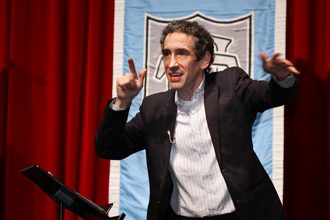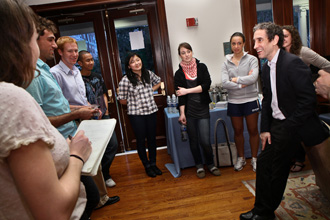Program or Be Programmed, Speaker Warns
Throughout history, those at the helm of culture, innovation and power were those holding the currency of intellectual and scientific commerce be it papyrus or movable type or Java. To have power in society, Douglas Rushkoff argued in a Tulane lecture, is to be fluent in the language and the systems by which society structures itself.

Douglas Rushkoff urges his audience to be savvy citizens of the Digital Age. (Photos by Guillermo Cabrera-Rojo)

Rushkoff talks with Tulane students during his visit to the uptown campus.
Rushkoff, a media theorist and author whose most recent book is Program or Be Programmed: Ten Commands for a Digital Age, noted the primacy of digital information means that “programming⦠is the vernacular of this era.” He spoke on Wednesday (Feb. 23) in Dixon Hall for the 2011 Newcomb-Tulane College Lecture.
In his talk, Rushkoff encouraged his audience at a bare minimum to understand that programming exists and how it works. He said it's important to contemplate the way in which technologies that propel us further into modernity are not simply elements of the landscape to be observed and interacted with naively. Rather, they are creations of human actors with goals and motivations of which we may be unaware.
From the invention of the remote control to the Nintendo joystick to the mouse and keyboard, Rushkoff chronicled a trajectory of media that bestowed upon media consumers the agency to control and create their own media experience.
In the rapid evolution of the Internet, however, Rushkoff sees a trend of media re-mystification and a widening gap between consumers and the ability to actively control their technology. Consumers are affected by advancements such as operating systems with preset menus and social media tools so pervasive and opaque that users forget there are men and women programming them with certain interests in mind.
Rushkoff warns that if we are not at least aware of the presence of other people in the sites and utilities we use in our interactions, we are susceptible to becoming objects that are programmed for certain ends not necessarily malicious ends, but ends not of our own choosing or design.
Cody Wild is a first-year student studying English and political economy.
